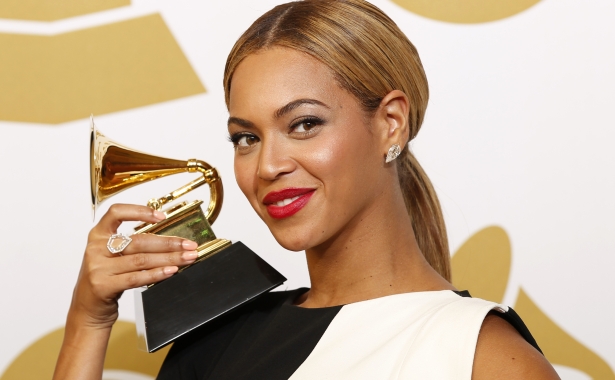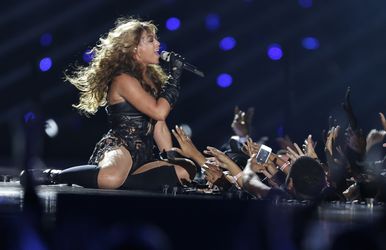Why Don't More People Call Beyonce a Genius?
Her usual accolades—"Queen Bey," "Beysus," and the like—don't get at the fact that she has made brilliant music. But she's probably OK with that.

Just about every month is Beyoncé month, and this month is no exception. She sang the national anthem at the inaugural, performed with an all-girl band at the Super-Bowl, and HBO is airing Beyoncé's self-directed bio/confessional/hagiography this weekend.
I was probably the last sentient thing on the planet to see the Super-Bowl performance, and I have no intention of watching the HBO documentary. You might think, therefore, that I don't care about Beyoncé. But that wouldn't be true. I'm actually a huge fan. I have all her albums, including 8 Days of Christmas, the Destiny's Child Christmas album, with its unashamedly materialistic title track and its amazing, rhapsodic, a-cappella closer, "Opera of the Bells."
In other words, I'm one of the few, the proud(?), the hipsters who are into Beyoncé for her musical genius rather than for her hooky goodness or superstar divaness. I bought The Writing's on the Wall, Destiny's Child's 1999 world-conquering breakthrough—and, like the rest of the world, I was conquered. After largely ignoring R&B for the better part of a decade, I was suddenly hooked and began consuming obsessively. I found a lot of great music, but with a couple of exceptions (Cassie's Ryan Leslie-produced self-titled debut; Brooke Valentine's bizarre, funky, hip, and utterly forgotten Chain Letter) The Writing's on the Wall remained, and remains, in a class by itself.
Trying to make the case for a giant, shiny, overplayed pop monster as an actual work of art often just causes snickers from all but the most hardened popists. But for me, listening to it again, it still sounds like a masterpiece. From the weird, looped discordant processed guitar fillip of "So Good" to the over-arranged, strutting, quartet-on-steroids, a-cappella desecration of "Amazing Grace," the album is sprawling, ambitious, and badass.
The giant girl-power hits still sound as great as ever, with the call-and-responses bouncing around and over Kevin Briggs's stuttering beats and high-gloss-yet-somehow-hollow production, so that you can imagine the singers, heads bent together, dissin' their deadbeat boyfriends or chastising stalkers in a giant abandoned mall. But the less-played tracks have treasures as well. "Temptation," with one of the singers (is that LaTavia?) leaning her throaty Houston accent into the sing-song little-girl chant, "So I bit my lip/switched my hips as I walked by," has to be one of the sexiest moments in pop.
And I'd almost forgotten about "Sweet Sixteen," with a bittersweet horn line floating through it and Beyoncé trying to reassure her interlocutor that life isn't over just because she had a baby. "Sixteen years, 16 prayers, 16 reasons why I care," the singers declaim, and then there's an odd, stop-time moment where they exclaim, "girrrrl" in a kind of gulping harmony that comes across as gentle reprimand, encouragement, and random goofy blip—almost like the singers are mom, girlfriend, and infant all at once. It's touching and ridiculous; the kind of sincere, random excess that you expect from an idiosyncratic pop genius, rather than from a professional hit machine.
Those moments of idiosyncratic pop genius have gotten fewer and fewer as Beyoncé's career has rolled along. You might argue that this is because she's working with different collaborators. It's always hard to know who to credit in high-production pop, and The Writing's on the Wall is certainly the underrated Kevin Brigg's triumph as well as Beyoncé's. But the singer's music has enough sporadic highlights that I can't write that breakthrough album off as a fluke. I pretty much never need to hear the bulk of her 2011 release 4 again, for example. But the spastic, lurching "Countdown"—where Beyoncé again was involved in both writing and production—shows pretty clearly that she can still put together a masterpiece if she wants to.
Obviously, she doesn't want to that often. Still, it's not like Beyoncé's the only musician to ever fall off—and it's not like she's turned into an embarrassing Metallica-level self-parody. She's more like Sonic Youth or Merle Haggard or Andre 3000: folks who aren't doing their best work anymore, but who I still have enough affection for that I'll pay at least glancing attention when they happen to wander across whatever screen I'm looking at.
Of course, Beyoncé is quite different from Sonic Youth or Merle Haggard in that she wanders across those screens a lot. She's also different in that when she does that wandering, I get the strong sense that I'm one of the few folks watching who thinks of her as "that-artist-who-once-made-incredible-music" rather than as "glam superstar diva." Everyone knows she's got a voice of monstrous hog-calling power, and The New Yorker's Sasha Frere-Jones argued for her merit as a "strange and brilliant musician" a couple of years back. But even he seemed to end up as impressed with her professionalism as with her artistry. More typical is Denette Wilford, who declares, "Beyoncé is one fierce, fabulous, over-the-top bitch who perfects every single move/hair toss/side eye/smile." "[T]hat's what makes her the Queen B," Wilford concludes. It's not the music, but the style, the showmanship, and the attitude.
The focus on style and showmanship is probably in part due to the genre Beyoncé works in—despite the popist efforts of folks like Sasha-Frere Jones, it's still a lot easier to be declared a musical genius if you're playing a guitar than if you're dancing in heels. And part of it is probably gender. Justin Timberlake regularly gets acclaimed as an auteur in a way that Beyoncé almost never does. And of course there's Michael Jackson. If Beyoncé was a guy, it might be easier for people to see her as both musician and god than it is for them to see her as musician and goddess.
But the biggest reason that Beyoncé isn't thought of as a musical artiste is probably because she doesn't want to be thought of that way—or at least doesn't really care whether she is or not. Folks like Prince or Michael Jackson were clearly invested in their musical reputation, but Beyoncé? Like I already said, much of her recent output has been forgettable. And here's a musician, after all, who—based on her Destiny's Child writing and production credits and her general artistic direction of the band even on songs with other producers—has an amazing talent and ear for vocal arrangements and harmony. The Beyoncé co-written/co-produced "Apple Pie a la Mode" from Survivor with its hiccupping nonsense syllables and voices twisting and sliding around each other sounds like it could almost have been put together by a funkier Brian Wilson. But solo artists sing solo—and so Beyoncé's largely abandoned her flair for group dynamics as a facet of her musical personality. When Kelly and Michelle showed up at the Super Bowl performance, their microphones barely even worked.
I don't begrudge Beyoncé her career decisions. I've still got her old albums, after all—and I'm as happy as the next heterosexual guy to watch her shake her thing in some ridiculous micro-outfit at the Super Bowl. Looking at her recent career though, I do have the disorienting sense—perhaps unmerited—that I like The Writing's on the Wall more than she does.
Of course, it's still possible that Beyoncé does think of The Writing's On The Wall as a classic album. But for the most part her focus seems elsewhere—both in the sense that she's looking forward, not back, and in the sense that "classic albums" don't seem like the part of her career she's paying attention to. For selfish reasons, I wish she'd decided to spend more time being a genius. But she probably figured, with some justice, that while there are plenty of geniuses, there's only one Beyoncé.
